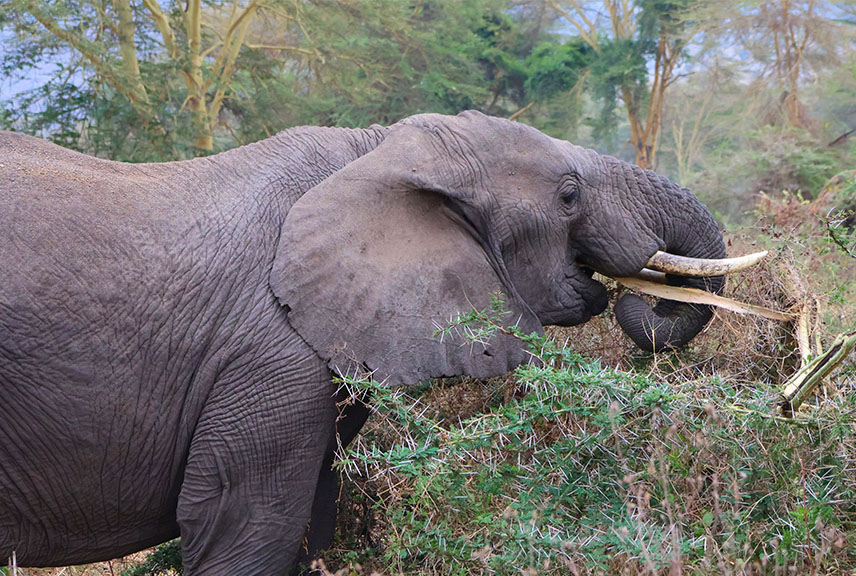
Tarangire National Park is one of the most renowned national parks of the northern circuit in Tanzania. It's famous for its large herds of massive elephants and huge, ancient baobab trees. In fact, Tarangire is home to some of world’s largest elephants.
Tarangire National Park is often visited in combination with Serengeti or Ngorongoro. Unlike these parks, Tarangire lies relatively close to Arusha and is also the only national park in the area where you can spot a large variety of animals, including many predators. This makes Tarangire the perfect national park for a daytrip as well
It’s also a quite large the national park and covers an area of approximately 2,850 square kilometers (1,100 square miles.) Tarangire National Park derived its name from the long serving river that crosses the park in the middle called the ‘Tarangire River’. The river acts as the primary source of water for wildlife in the park, which is also one of the reasons of the large variety in the parks ecosystem.
In the park you might encounter good numbers of wildebeest and zebra as well as giraffe, buffalo, Thompson’s gazelle, greater and lesser kudu, eland, leopard and cheetah. It is also the only place in Tanzania where the oryx and gerenuk are regularly spotted
In the park you might encounter good numbers of wildebeest and zebra as well as giraffe, buffalo, Thompson’s gazelle, greater and lesser kudu, eland, leopard and cheetah. It is also the only place in Tanzania where the oryx and gerenuk are regularly spotted
Tarangire is also home to nearly 500 species of birds. Among which the most famous are the lovebirds that are yellow collared, Kori bustard, the stocking-thighed ostrich, the shy starlings are in plenty and widespread in Tanzania. Wildlife
Witness a lot of migratory movement of elephants joined with other animals with greater Tarangire ecosystem. Many chances to explore plenty of wildlife like zebras, searching for underground streams in the dry river beds, flocks of up to about 300 elephants and many more.
Witness a lot of migratory movement of elephants joined with other animals with greater Tarangire ecosystem. Many chances to explore plenty of wildlife like zebras, searching for underground streams in the dry river beds, flocks of up to about 300 elephants and many more.
Enjoy spotting a large batch of colorful and exclusive bird species.
Enjoy spotting a large batch of colorful and exclusive bird species.
The river is fed by seasonal sand rivers originating to the East and South-eastern parts of the park. It flows northward along the park and empties into Lake Burunge. Within the park, the river is linked to/with Silale, Gurusi and Larmakau swamps.
It is undoubtedly that Tarangire River with its associated permanent swamps serves as critical dry season water sources for thousands of migratory animals in dry seasons, thus offering a fantastic game drive experience. Best time to Visit Tarangire National Park Tarangire National Park is considered to be a year-round safari destination, but there’s definitely a period that’s better for wildlife viewing.
The best season to view wildlife in Tarangire is usually from June to October (the dry season). Large herds of animals migrate to the park from the surrounding areas due to the plentiness of water available that flows from the Tarangire river. During the dry season you may also find most of the elephants that Tarangire National Park is so famous for.
During the wet seasons (November-December and March-May) animals are harder to spot as there’s a lot of green, thick vegetation in the park. Much of the wildlife, especially the elephants, scatter during this time period in search for more solid and dry ground.
118 km (75 miles) southwest of ArushaEasy drive from Arusha or Lake Manyara following a surfaced road to within 7km (four miles) of the main entrance gate; can continue on to Ngorongoro Crater and the Serengeti.Charter flights from Arusha and the Serengeti.
Tarangire has a bimodal rainfall with short rains from October to December, long rains from March to May and dry season from June to October and January to February. The highest day temprature goes up to 380C in January to February but drops to 150C in July.